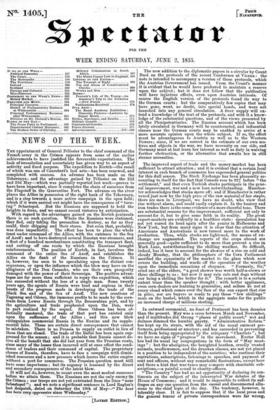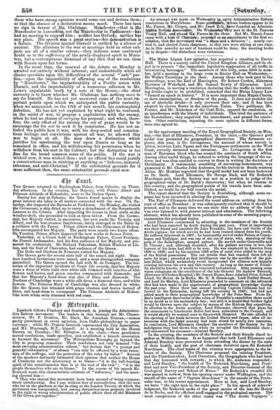In outward ceremonial, no feast of Pentecost has been drearier
than the present. May was a cross between March and November, and if multitudes did throng "places of public resort," wet and dulness dimmed the humble gayety. "Administrative Reform" has kept up its strain, with the aid of the usual eminent per- formers,-professional or amateur ; and has succeeded in preventing itself from being appropriated by the reliquary " Chartists "; but we have no signs of "progress" in the movement. Exeter Hall has had its usual lay congregations in the form of "May meet- ings " : but the aborigines, the benighted heathen, cruelly treated animals, needlewomen, and the drunken classes, are not yet placed in a position to be independent of the societies; who continue their aspirations, subscriptions, listenings to speeches, and payment of rent and officers, without any remarkable fluctuations, except here and there a hint that war-taxes may compete with charitable sub- scriptions,—a painful sound to charity-officers.
"The Country" has had no set opportunity of declaring its sen- timents on the subject of the interrupted War debates of the House of Commons; and it would be impossible to collect its suf- frages on any one question from the casual and disconnected allu- sions to the chief topic of the day. The tendency, however, is Itolerably clear. It is fair to suppose that if the local press and the general team= of private correspondence were far wrong, those who have strong opinions would come out and declare them; so that the absence of a declaration means much. There has been no sign in favour of Mr. Gladstone. Manchester—ghat is the Manchester in LanceAire, not the Manchester in Parliament—has had no meeting to support him ; neither has Oxford; neither has any place. His speech was a great oration—his demonstration is a failure. The division against Disraeli is ratified by a silence of content. The allusions to the war at meetings held on other sub- jects are all of a similar colour,—they indicate some continued doubt as to the sufficiency of the newly-displayed spirit in Minis- ters but a contemptuous dismissal of any idea that we can close with Russia upon her terms.
In the mean time, the renewal of the debate on Monday is awaited not entirely without interest; and undoubtedly while all classes speculate upon the difficulties of the several "anti" par- ties,—upon the impossibility of affirming any of the resolutions by "Manchester," the impracticability of a Peelite union with Disraeli, and the improbability of a numerous adhesion to Mr. Lowe's unpalatable truth by a vote of the House,—the chief curiosity is to know whether Mr. Gladstone has nothing more to Jay for himself. He has not yet answered some of the most im- portant points upon which we anticipated the public curiosity, when we announced, on the 19th of last month, his contemplated defection. He has not yet explained by what right he -ventured, in the midst of war, to propose a capitulation with the enemy, when he had no chance of carrying his proposal ; and when, there- fore, the only effect of his raising the cry of peace would be to encourage the foe not to seek it by concession. He has not sa- tisfied the public how it was, with his deep-seated and conscien- tious feelings and convictions against all war, he allowed this war to begin at all. He may draw a distinction which justifies his sanctioning the war upon Russia so long as he remained in office, and his withdrawing his permission when he withdrew from his seat in the Cabinet; but the distinction is too fine for the broad common sense of the public. If the war is wicked now, it was wicked then ; and no official ties could justify a conscientious man in winking at anything so "hideous, immoral, inhuman, and anti-Christian." If the substantial grounds for it were sufficient then, the same substantial grounds exist now.



























